|
Read about
more faculty achievements in Faculty News.
TOBACCO PROGRAM ACCREDITED
The College of Medicine AHEC program
is officially one of the country’s best in training experts who treat people
for tobacco dependence. The program recently received national accreditation
through the Association for the Treatment of Tobacco Use and Dependence for
its course titled
Tobacco Treatment Specialist Training: 3-Day Foundation.
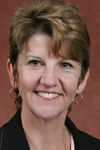 “FSU AHEC is now one of only five programs in the nation that have
achieved this accreditation,” said Andrée Aubrey
(pictured here), Area
Health Education Center program director at Florida State University.
Included among the five is the Mayo Clinic Nicotine Dependence Center. “FSU AHEC is now one of only five programs in the nation that have
achieved this accreditation,” said Andrée Aubrey
(pictured here), Area
Health Education Center program director at Florida State University.
Included among the five is the Mayo Clinic Nicotine Dependence Center.
Aubrey said the course “was created with the goal of training the
health-professions workforce and retaining tobacco contract dollars within
Florida. Before this course was developed, the AHECs, rural hospitals and
other tobacco-services providers were using out-of-state training programs.”
She saluted the work of the FSU AHEC team: Mary Dailey,
assistant AHEC director; Karen Geletko; Chenikka
Usher; and Les Beitsch, M.D., J.D., associate dean for health
affairs.
NEWS FROM HAVANA MIDDLE SCHOOL
The
College of Medicine is part of a team that’s working to open a wellness
center at Havana Middle School in August. “We decided to create a
center where we have students from pharmacy, allied health, dental hygiene,
nursing, physical therapy and medicine working together,” said Maggie
Blackburn, M.D.
Get
the details, including the long list of partners in this project.
AN IMPRESSIVE OUTING FOR THE GERIATRICS DEPARTMENT
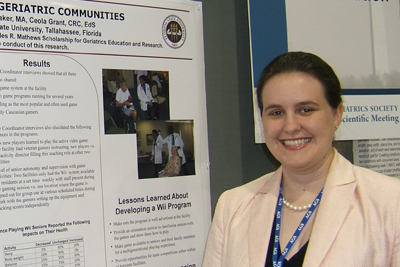 The Department of Geriatrics made a strong showing in May at the annual
meeting of the American Geriatrics Society. It had two
posters accepted for the prestigious Presidential Poster session. One was
“Benefits of the Wii Video Game in Geriatric Communities” (Class of 2013
student Mary O’Meara (pictured here),
Lisa Granville, M.D., Suzanne Baker, Ceola Grant). O’Meara
won Best Student Poster for the Quality of Life research section of the
annual meeting. (Her work was supported by grants from the Reynolds
Foundation and by a donation from the late Charles Mathews,
M.D.) The other
Presidential Poster was “ElderQuest: Video game fun with the AAMC
competencies” (Alice Pomidor, M.D., Bill Pomidor,
Granville, Ken Brummel-Smith, M.D., Baker). The Department of Geriatrics made a strong showing in May at the annual
meeting of the American Geriatrics Society. It had two
posters accepted for the prestigious Presidential Poster session. One was
“Benefits of the Wii Video Game in Geriatric Communities” (Class of 2013
student Mary O’Meara (pictured here),
Lisa Granville, M.D., Suzanne Baker, Ceola Grant). O’Meara
won Best Student Poster for the Quality of Life research section of the
annual meeting. (Her work was supported by grants from the Reynolds
Foundation and by a donation from the late Charles Mathews,
M.D.) The other
Presidential Poster was “ElderQuest: Video game fun with the AAMC
competencies” (Alice Pomidor, M.D., Bill Pomidor,
Granville, Ken Brummel-Smith, M.D., Baker).
Another College of Medicine student-and-faculty poster was
accepted: “Developing Functional Assessment Skills Through Service Learning”
(Donna Jacobi, M.D., Paul McLeod, M.D., and Class of 2010 alumni
Stephenie Scully and
Erin Golden). Jacobi, geriatrics clerkship director in Pensacola, presented
two other posters: “Going Home Alone: Patient Characteristics in a Targeted
Transitional Care Pilot” (with Cheryl Piling and Angel Kelly Shelby) and
“Applying ABCs of Behavior Management to Nursing Home Quality Improvement.”
The faculty also presented in a number of workshops. Pomidor
presented her work on “ElderQuest.” Granville developed, organized and presented two workshops: “Solving the Competency-Based Evaluation Mystery: A Workshop for
Assessing Geriatrics Competencies for Students, Residents, and Fellows,” and “Competency Certification in Gait and Fall Risk Evaluation for
Medical Students, Residents, and Other Health Care Practitioners.”
Brummel-Smith was impressed by it all: “The College of Medicine’s innovative teaching and
learning initiatives are receiving national attention, and interest is
growing in our work in implementing competency-based evaluations.”
SPEAKING OF ‘ELDERQUEST’…
The “ElderQuest” project was featured
prominently in the June issue of the AAMC Reporter. “Video Games as Medical
Education Tools,” the article by Scott Harris, reported that “Medical
schools around the country are creating video games with the expressed goal
of improving medical education.”
Harris quoted Bryan Bergeron, M.D.,
a research affiliate with Harvard Medical School and MIT, saying that the
games are “a way to get people excited. When you’re excited, your mind works
better. Your synapses are f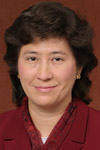 iring more rapidly, and your brain is fully
awake. In games, there is a sense of uncertainty. If you know what’s going
to happen, there’s no harm in going to sleep. But with games, it’s
different. You’re fully awake, and the information gets into your cortex.” iring more rapidly, and your brain is fully
awake. In games, there is a sense of uncertainty. If you know what’s going
to happen, there’s no harm in going to sleep. But with games, it’s
different. You’re fully awake, and the information gets into your cortex.”
In “ElderQuest,” players must locate the Gray Sage and nurse the
powerful but ailing wizard back to health. “Geriatrics is often overlooked
and seen as difficult, or not overly glamorous,” Pomidor
(pictured here) told Harris. “The
students need to have something fun to do. If it’s fun, they’ll play it
whether they want to learn or not. So far, they think the idea is really
cool. We feel we need to do something for the millennial generation. They
don’t read, they multitask, and they do everything online.”
(Watch
for a feature article on “ElderQuest” in a future issue of FSU MED
magazine.)
HIGH-SCHOOLERS SAMPLE MED SCHOOL
Sixty-one students
from across Florida participated in one of three Summer I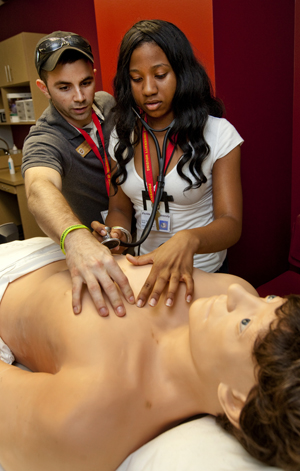 nstitute sessions
at the College of Medicine. The weeklong sessions, for rising juniors and
seniors, provide an inside look at what it means to be both a doctor and a
medical student. It’s one way to encourage students from diverse backgrounds
to consider a career in medicine. nstitute sessions
at the College of Medicine. The weeklong sessions, for rising juniors and
seniors, provide an inside look at what it means to be both a doctor and a
medical student. It’s one way to encourage students from diverse backgrounds
to consider a career in medicine.
“Our goal for the Summer Institute is to recruit students from rural,
underserved and minority backgrounds and, at the same time, recruit students
from other parts of Florida who have a desire to work in medically
underserved areas,” said Thesla Berne-Anderson, director of college and
pre-college outreach.
This summer, various
community partners helped cover some of the students’ tuition. Capital
Health Plan, for example, provided support for two students from Gadsden and
Wakulla counties. In Collier County, the Immokalee Foundation supported three
participants. And with an eye toward creating future physicians for Sarasota
and Manatee counties, U.S. Rep. Vern Buchanan provided financial support for
two participants from his area.
In the
photo, Class of 2014 student Chris McDonald
instructs a Summer Institute participant in the Clinical Skills and
Simulation Center.
HELLO FROM HARVARD MACY
You
might not think an 11-year-old medical school needs to think about
change, but don’t say that around Myra Hurt. Even in this nearly new school,
she says, people talk about “the way we’ve always done things.” Her
fascination with finding a better way of educating medical students was the
driving force behind this school’s creation – and some of her inspiration
came from a 1999 Harvard Macy Institute se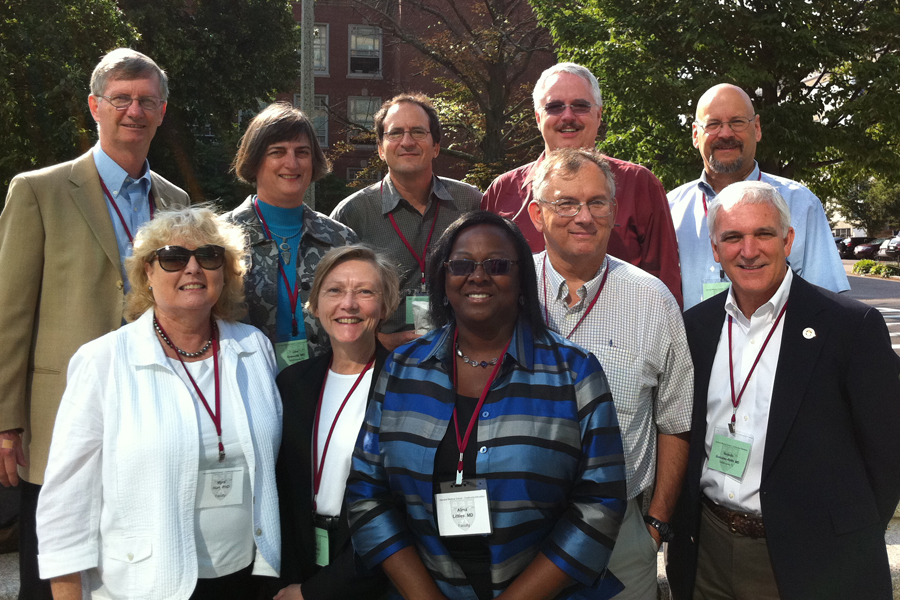 ssion. Harvard Macy exists to help
health-care educators worldwide discover how to lead organizational change. ssion. Harvard Macy exists to help
health-care educators worldwide discover how to lead organizational change.
Hurt
has been back many times. But this spring it was a thrill for her
to return with most of the College of Medicine’s leadership team. “For them
to be sharing their ideas with people from all over the world, and picking
up new ideas from people on the cutting edge of change – to have the College
of Medicine right there in the mix – it was wonderful,” she said.
With this school's current emphasis on curriculum reform, the
timing was perfect. Since their return, the medical school’s Harvard Macy
alumni have formed a working group. The ideas keep percolating.
Front
row, from left: Myra Hurt, Ph.D., senior associate dean for research and graduate
programs; Nancy Hayes, Ph.D., director of clinical foundations;
Alma Littles,
M.D., senior associate dean for medical education and academic affairs; Richard
Nowakowski, Ph.D., biomedical sciences chair; Ricardo Gonzalez-Rothi,
M.D., clinical sciences chair. Second row, from left: John Fogarty,
M.D., dean;
Lisa Granville,
M.D., geriatrics associate chair; Les Beitsch,
M.D., J.D., health
affairs director;
Dan Van Durme, M.D., family medicine chair; and
Ken Brummel-Smith, M.D., geriatrics chair.
|




 “FSU AHEC is now one of only five programs in the nation that have
achieved this accreditation,” said Andrée Aubrey
(pictured here), Area
Health Education Center program director at Florida State University.
Included among the five is the Mayo Clinic Nicotine Dependence Center.
“FSU AHEC is now one of only five programs in the nation that have
achieved this accreditation,” said Andrée Aubrey
(pictured here), Area
Health Education Center program director at Florida State University.
Included among the five is the Mayo Clinic Nicotine Dependence Center. iring more rapidly, and your brain is fully
awake. In games, there is a sense of uncertainty. If you know what’s going
to happen, there’s no harm in going to sleep. But with games, it’s
different. You’re fully awake, and the information gets into your cortex.”
iring more rapidly, and your brain is fully
awake. In games, there is a sense of uncertainty. If you know what’s going
to happen, there’s no harm in going to sleep. But with games, it’s
different. You’re fully awake, and the information gets into your cortex.”